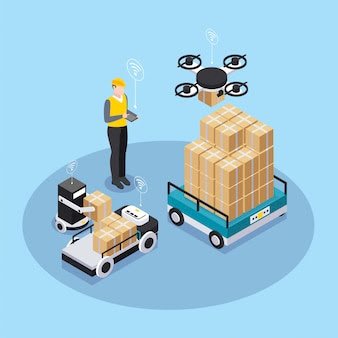Logistics companies have begun to see improvements in productivity and profitability after investing in internal digital experiences, such as AI. These typically emulate how their employees interact with technology in their daily lives. In fact, we are experiencing an increasingly evident blurring of the lines between personal and professional life thanks to technology.
According to market research, the majority of workers worldwide reported positive effects from having technology as part of their work tools. While technology is often associated with hobbies and pastimes rather than work, it has become a valuable tool for the logistics industry.
During the pandemic, the relationship with digital devices and solutions in the workplace strengthened, becoming a substantial component of remote work. So much so that 65% of employees have felt more efficient working from home. For this reason, many companies have chosen to make technology a key asset of their business.
Artificial Intelligence leads to more dynamic ways of working
With intelligent automation and self-service tools, companies can optimize their relationships with employees and empower their workforce to achieve their goals. Properly implemented automation helps organizations build smarter and more efficient ways of working. It also serves as a compass for navigating the future with a continuous improvement strategy. One reason why employees and workers often avoid the topic of Artificial Intelligence is the perception of it as a complex subject.
This interpretation will limit businesses that avoid AI and remain mere spectators, which, in the face of the digital revolution, could put them at risk of falling behind in the market transformation. That's why experts are urging people to view AI as an ally, a machine with the capacity to have a more comprehensive understanding than humans.
How to prepare for warehouse automation?
Implementing AI in manufacturing has become a challenge in Latin America, and one of the advantages of using artificial intelligence is precisely that it helps address this challenge. Business operations are rarely perfect; there are always gaps, redundancies, or unnecessary complexities that prevent organizations from achieving true overall efficiency. Identifying these points of friction is an essential first step toward improving how work is done.
If the goal is to eliminate the impact on productivity caused by repetition in processes where different business areas converge, AI can give businesses the opportunity to explore whether it is possible to manage and solve problems through automation.
Priorities for logistics businesses
Artificial Intelligence solutions have become the third highest investment priority for companies. However, this investment is often directed toward the early stages of adoption. Many Latin American countries have progressed more rapidly toward digital maturity: 53% of businesses in the country have taken their digitization strategies beyond the pilot program phase.
AI is improving the experience of work teams, optimizing the customer experience, maximizing productivity, and unlocking new revenue streams.
How can Artificial Intelligence be applied to logistics?
Logistics processes with AI can be very useful and represents a further step in the evolution of Logistics 4.0. Here are some of the functions where AI can be used in logistics, warehouse organization, and order picking and shipping:
Manage warehouse inventory
By using AI-powered software and robots, it's possible to implement an inventory process and store products as they arrive, optimizing space utilization and selecting locations that align with their projected turnover.
Predicting consumer trends
Through data learning, Artificial Intelligence can anticipate future customer orders and adjust stock levels.
Automating order preparation: AI and robotics can also streamline shipment preparation, speeding up the selection and handling of packaging.
Control the transport of goods leaving the warehouse
By designing more agile transport routes, including real-time correction, that adapt to the challenges of last-mile logistics in e-commerce.
Evaluate quality control
By tracking everything using AI, it's easier to detect any errors, inefficiencies, or wasted time in the process.
Optimize the work of human resources
With AI, physical labor is reserved for the most skilled and creative tasks. In fact, Artificial Intelligence can adopt eco-responsible practices such as turning lights and machines on or off depending on the time of day or work pace, thus contributing to the green logistics approach.
Implementing AI doesn't mean the end of jobs for people; rather, their efforts will be focused on data analysis or engineering tasks instead of more repetitive functions. If logistics companies want to implement the latest technology, now is the ideal time to do so.






